- Home
- Louisa May Alcott
A Merry Christmas
A Merry Christmas Read online
PENGUIN CLASSICS
A MERRY CHRISTMAS
Louisa May Alcott (1832–88) was born in Germantown, Pennsylvania, in 1832, the second of four daughters of Abigail May Alcott and Bronson Alcott, the prominent Transcendentalist thinker and social reformer. Raised in Concord, Massachusetts, and educated by her father, she early on came under the influence of the great men of her father’s circle: Emerson, Hawthorne, the preacher Theodore Parker, and Thoreau. From her youth, she worked at various tasks to help support her family: sewing, teaching, domestic service, and writing. In 1862, she volunteered to serve as an army nurse in a Union hospital during the Civil War—an experience that provided her material for her first successful book, Hospital Sketches (1863). Between 1863 and 1869, she published several anonymous and pseudonymous Gothic romances and lurid thrillers. But fame came with the publication of her Little Women (1868–69), a novel based on the childhood adventures of the four Alcott sisters. In the wake of Little Women’s popularity, she brought out An Old-Fashioned Girl (1870), Little Men (1871), Eight Cousins (1875), Rose in Bloom (1876), Jo’s Boys (1886), and other books for children, as well as two adult novels, Moods (1865) and Work (1873). An active participant in the women’s suffrage and temperance movements during the last decade of her life, she died in Boston on the day her father was buried.
PENGUIN BOOKS
Published by the Penguin Group
Penguin Group (USA) LLC
375 Hudson Street
New York, New York 10014
USA | Canada | UK | Ireland | Australia New Zealand | India | South Africa | China
penguin.com
A Penguin Random House Company
This edition published in Penguin Books 2014
LIBRARY OF CONGRESS CATALOGING-IN-PUBLICATION DATA
Alcott, Louisa May, 1832–1888.
[Short stories. Selections]
A merry Christmas, and other Christmas stories / Louisa May Alcott.
pages cm — (Penguin classics)
eBook ISBN 978-0-698-17092-6
1. Christmas stories, American. I. Title.
PS1016 2014
813'.4—dc23
2014012790
Version_1
Contents
About the Author
Title Page
Copyright
A MERRY CHRISTMAS
A Merry Christmas
Kate’s Choice
The Quiet Little Woman
Tilly’s Christmas
What Love Can Do
Rosa’s Tale
Mrs. Podgers’ Teapot
A Merry Christmas
From Little Women
JO WAS THE FIRST TO WAKE IN THE GRAY DAWN of Christmas morning. No stockings hung at the fireplace, and for a moment she felt as much disappointment as she did long ago, when her little sock fell down because it was so crammed with goodies. Then she remembered her mother’s promise, and slipping her hand under her pillow, drew out a little crimson-covered book. She knew it very well, for it was that beautiful old story of the best life ever lived, and Jo felt that it was a true guidebook for any pilgrim going the long journey. She woke Meg with a “Merry Christmas” and bade her see what was under her pillow. A green-covered book appeared, with the same picture inside, and a few words written by their mother, which made their one present very precious in their eyes. Presently Beth and Amy woke, to rummage and find their little books also—one dove-colored, the other blue; and all sat looking at and talking about them, while the East grew rosy with the coming day.
In spite of her small vanities, Margaret had a sweet and pious nature, which unconsciously influenced her sisters, especially Jo, who loved her very tenderly, and obeyed her because her advice was so gently given.
“Girls,” said Meg, seriously, looking from the tumbled head beside her to the two little nightcapped ones in the room beyond, “Mother wants us to read and love and mind these books, and we must begin at once. We used to be faithful about it; but since father went away, and all this war trouble unsettled us, we have neglected many things. You can do as you please; but I shall keep my book on the table here, and read a little every morning as soon as I wake, for I know it will do me good, and help me through the day.”
Then she opened her new book and began to read. Jo put her arm around her, and, leaning cheek to cheek, read also, with the quiet expression so seldom seen on her restless face.
“How good Meg is! Come, Amy, let’s do as they do. I’ll help you with the hard words, and they’ll explain things if we don’t understand,” whispered Beth, very much impressed by the pretty books and her sisters’ example.
“I’m glad mine is blue,” said Amy; and then the rooms were very still while the pages were softly turned, and the winter sunshine crept in to touch the bright heads and serious faces with a Christmas greeting.
“Where is Mother?” asked Meg, as she and Jo ran down to thank her for their gifts, half an hour later.
“Goodness only knows. Some poor creeter come a-beggin’, and your ma went straight off to see what was needed. There never was such a woman for givin’ away vittles and drink, clothes and firin’,” replied Hannah, who had lived with the family since Meg was born, and was considered by them all more as a friend than a servant.
“She will be back soon, I guess; so do your cakes, and have everything ready,” said Meg, looking over the presents which were collected in a basket and kept under the sofa, ready to be produced at the proper time. “Why, where is Amy’s bottle of cologne?” she added, as the little flask did not appear.
“She took it out a minute ago, and went off with it to put a ribbon on it, or some such notion,” replied Jo, dancing about the room to take the first stiffness off the new army slippers.
“How nice my handkerchiefs look, don’t they? Hannah washed and ironed them for me, and I marked them all myself,” said Beth, looking proudly at the somewhat uneven letters which had cost her such labor.
“Bless the child; she’s gone and put ‘Mother’ on them instead of M. March; how funny!” cried Jo, taking up one.
“Isn’t it right? I thought it was better to do it so, because Meg’s initials are ‘M.M.,’ and I don’t want anyone to use these but Marmee,” said Beth, looking troubled.
“It’s all right, dear, and a very pretty idea; quite sensible, too, for no one can ever mistake now. It will please her very much, I know,” said Meg, with a frown for Jo and a smile for Beth.
“There’s mother; hide the basket, quick!” cried Jo, as a door slammed and steps sounded in the hall.
Amy came in hastily and looked rather abashed when she saw her sisters all waiting for her.
“Where have you been, and what are you hiding behind you?” asked Meg, surprised to see, by her hood and cloak, that lazy Amy had been out so early.
“Don’t laugh at me, Jo; I didn’t mean anyone should know till the time came. I only meant to change the little bottle for a big one, and I gave all my money to get it, and I’m truly trying not to be selfish anymore.”
As she spoke, Amy showed the handsome flask which replaced the cheap one; and looked so earnest and humble in her little effort to forget herself that Meg hugged her on the spot and Jo pronounced her “a trump,” while Beth ran to the window and picked her finest rose to ornament the stately bottle.
“You see I felt ashamed of my present, after reading and talking about being good this morning, so I ran ’round the corner and changed it the minute I was up; and I’m so glad, for mine is the handsomest now.”
Another bang of the street door sent the basket under the sofa and the girls to the table eager for breakfast.
“Merry Christmas, Marmee! Lots of them! Thank you for our books; we read some, and mean to every da
y,” they cried in chorus.
“Merry Christmas, little daughters! I’m glad you began at once and hope you will keep on. But I want to say one word before we sit down. Not far away from here lies a poor woman with a little newborn baby. Six children are huddled into one bed to keep from freezing, for they have no fire. There is nothing to eat over there; and the oldest boy came to tell me they were suffering hunger and cold. My girls, will you give them your breakfast as a Christmas present?”
They were all unusually hungry, having waited nearly an hour, and for a minute no one spoke; only a minute, for Jo exclaimed impetuously:
“I’m so glad you came before we began!”
“May I go and help carry the things to the poor little children?” asked Beth, eagerly.
“I shall take the cream and the muffins,” added Amy, heroically giving up the articles she most liked.
Meg was already covering the buckwheats and piling the bread into one big plate.
“I thought you’d do it,” said Mrs. March, smiling as if satisfied. “You shall all go and help me, and when we come back, we will have bread and milk for breakfast and make it up at dinner time.”
They were soon ready, and the procession set out. Fortunately, it was early, and they went through back streets, so few people saw them, and no one laughed at the funny party.
A poor, bare, miserable room it was, with broken windows, no fire, ragged bedclothes, a sick mother, wailing baby, and a group of pale, hungry children cuddled under one old quilt, trying to keep warm. How the big eyes stared and the blue lips smiled, as the girls went in!
“Ach, mein Gott! It is good angels come to us!” cried the poor woman, crying for joy.
“Funny angels in hoods and mittens,” said Jo, and set them laughing.
In a few minutes it really did seem as if kind spirits had been at work there. Hannah, who had carried wood, made a fire, and stopped up the broken panes with old hats and her own shawl. Mrs. March gave the mother tea and gruel, and comforted her with promises of help, while she dressed the little baby as tenderly as if it had been her own. The girls, meantime, spread the table, set the children round the fire, and fed them like so many hungry birds; laughing, talking, and trying to understand the funny broken English.
“Das ist gute!” “Der angel-kinder!” cried the poor things, as they ate and warmed their purple hands at the comfortable blaze. The girls had never been called angel children before, and thought it very agreeable, especially Jo, who had been considered “a Sancho” ever since she was born. That was a very happy breakfast, though they didn’t get any of it; and when they went away, leaving comfort behind, I think there were not in all the city four merrier people than the hungry little girls who gave away their breakfasts, and contented themselves with bread and milk on Christmas morning.
“That’s loving our neighbor better than ourselves, and I like it,” said Meg, as they set out their presents, while their mother was upstairs collecting clothes for the poor Hummels.
Not a very splendid show, but there was a great deal of love done up in the few little bundles; and the tall vase of red roses, white chrysanthemums, and trailing vines, which stood in the middle, gave quite an elegant air to the table.
“She’s coming! Strike up, Beth, open the door, Amy. Three cheers for Marmee!” cried Jo, prancing about, while Meg went to conduct mother to the seat of honor.
Beth played her gayest march, Amy threw open the door, and Meg enacted escort with great dignity. Mrs. March was both surprised and touched, and smiled with her eyes full as she examined her presents and read the little notes which accompanied them. The slippers went on at once; a new handkerchief was slipped into her pocket, well scented with Amy’s cologne; the rose was fastened in her bosom; and the nice gloves were pronounced “a perfect fit.”
There was a good deal of laughing and kissing and explaining, in the simple loving fashion which makes these home festivals so pleasant at the time, so sweet to remember long afterward, and then all fell to work.
The morning charities and ceremonies took so much time that the rest of the day was devoted to preparations for the evening festivities. Being still too young to go often to the theatre, and not rich enough to afford any great outlay for private performances, the girls put their wits to work, and, necessity being the mother of invention, made whatever they needed. Very clever were some of their productions; pasteboard guitars, antique lamps made of old-fashioned butter-boats covered with silver paper, gorgeous robes of old cotton glittering with tin spangles from a pickle factory, and armour covered with the same useful diamond-shaped bits left in sheets when the lids of tin preserve pots were cut out. The furniture was used to being turned into topsy-turvy, and the big chamber was the scene of many innocent revels.
No gentlemen were admitted; so Jo played male parts to her heart’s content and took immense satisfaction in a pair of russet-leather boots given her by a friend who knew a lady who knew an actor. These boots, an old foil, and a slashed doublet once used by an artist for some picture, were Jo’s chief treasures, and appeared on all occasions. The smallness of the company made it necessary for the two principal actors to take several parts apiece; and they certainly deserved some credit for the hard work they did in learning three or four different parts, whisking in and out of various costumes, and managing the stage besides. It was excellent drill for their memories, a harmless amusement, and employed many hours which otherwise would have been idle, lonely, or spent in less profitable society.
On Christmas night, a dozen girls piled on to the bed, which was the dress circle, and sat before the blue and yellow chintz curtains, in a most flattering state of expectancy. There was a good deal of rustling and whispering behind the curtain, a trifle of lamp smoke, and an occasional giggle from Amy, who was apt to get hysterical in the excitement of the moment. Presently a bell sounded, the curtains flew apart, and the Operatic Tragedy began.
“A gloomy wood,” according to the one playbill, was represented by a few shrubs in pots, a green baize on the floor, and a cave in the distance. This cave was made with a clotheshorse for a roof, bureaus for walls; and in it was a small furnace in full blast, with a black pot on it, and an old witch bending over it. The stage was dark, and the glow of the furnace had a fine effect, especially as real steam issued from the kettle when the witch took off the cover. A moment was allowed for the first thrill to subside; then Hugo, the villain, stalked in with a clanking sword at his side, a slouched hat, black beard, mysterious cloak, and the boots. After pacing to and fro in much agitation, he struck his forehead, and burst out in a wild strain, singing of his hatred to Roderigo, his love for Zara, and his pleasing resolution to kill the one and win the other. The gruff tones of Hugo’s voice, with an occasional shout when his feelings overcame him, were very impressive, and the audience applauded the moment he paused for breath. Bowing with the air of one accustomed to public praise, he stole to the cavern and ordered Hagar to come forth with a commanding, “What ho! Minion! I need thee!”
Out came Meg, with gray horsehair hanging about her face, a red and black robe, a staff, and cabalistic signs upon her cloak. Hugo demanded a potion to make Zara adore him, and one to destroy Roderigo. Hagar, in a fine dramatic melody promised both, and proceeded to call up the spirit who would bring the love philter:
“Hither, hither, from thy home,
Airy sprite, I bid thee come!
Born of roses, fed on dew,
Charms and potions canst thou brew?
Bring me here, with elfin speed,
The fragrant philter which I need;
Make it sweet, and swift and strong;
Spirit, answer now my song!”
A soft strain of music sounded, and then at the back of the cave appeared a little figure in cloudy white, with glittering wings, golden hair, and a garland of roses on its head. Waving a wand, it sung:
“Hither I come,
From my airy home,
Afar in the silver moon;
&nb
sp; Take the magic spell,
Oh, use it well!
Or its power will vanish soon!”
And dropping a small gilded bottle at the witch’s feet, the spirit vanished. Another chant from Hagar produced another apparition—not a lovely one, for, with a bang, an ugly, black imp appeared, and having croaked a reply, tossed a dark bottle at Hugo, and disappeared with a mocking laugh. Having warbled his thanks and put the potions in his boots, Hugo departed; and Hagar informed the audience that, as he had killed a few of her friends in times past, she has cursed him, and intends to thwart his plans and be revenged on him. Then the curtain fell, and the audience reposed and ate candy while discussing the merits of the play.
A good deal of hammering went on before the curtain rose again; but when it became evident what a masterpiece of stage-carpentering had been got up, no one murmured at the delay. It was truly superb! A tower rose to the ceiling; halfway up appeared a window with a lamp burning at it, and behind the white curtain appeared Zara in a lovely blue and silver dress, waiting for Roderigo. He came, in gorgeous array, with plumed cap, red cloak, chestnut lovelocks, a guitar, and the boots, of course. Kneeling at the foot of the tower, he sung a serenade in melting tones. Zara replied, and after a musical dialogue, consented to fly. Then came the grand effect of the play. Roderigo produced a ropeladder with five steps to it, threw up one end, and invited Zara to descend. Timidly she crept from her lattice, put her hand on Roderigo’s shoulder and was about to leap gracefully down, when, “alas, alas for Zara!” she forgot her train—it caught in the window; the tower tottered, leaned forward, fell with a crash, and buried the unhappy lovers in the ruins!

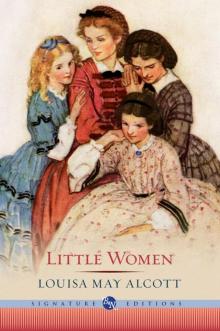 Little Women
Little Women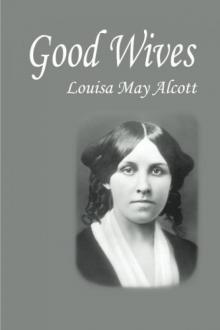 Good Wives
Good Wives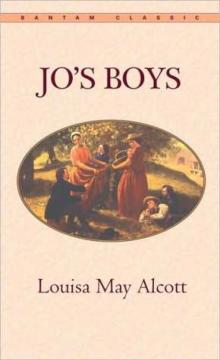 Jo's Boys
Jo's Boys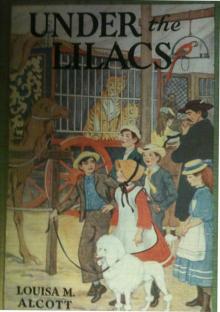 Under the Lilacs
Under the Lilacs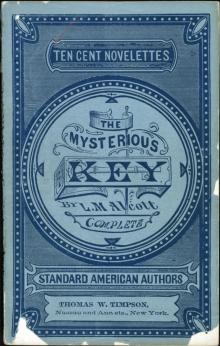 The Mysterious Key and What It Opened
The Mysterious Key and What It Opened The Inheritance
The Inheritance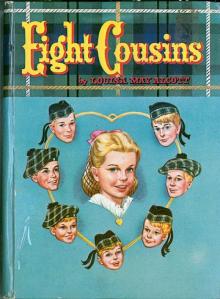 Eight Cousins
Eight Cousins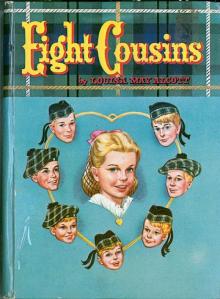 Eight Cousins; Or, The Aunt-Hill
Eight Cousins; Or, The Aunt-Hill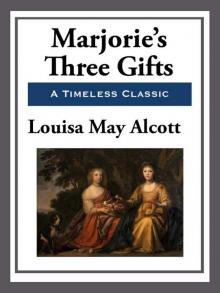 Marjorie's Three Gifts
Marjorie's Three Gifts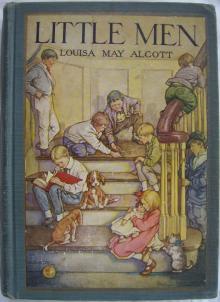 Little Men
Little Men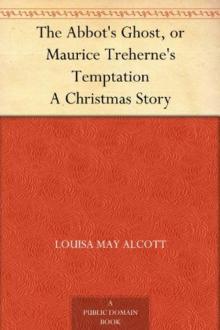 The Abbot's Ghost, or Maurice Treherne's Temptation: A Christmas Story
The Abbot's Ghost, or Maurice Treherne's Temptation: A Christmas Story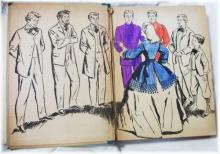 Rose in Bloom
Rose in Bloom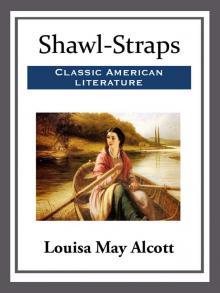 Shawl-Straps
Shawl-Straps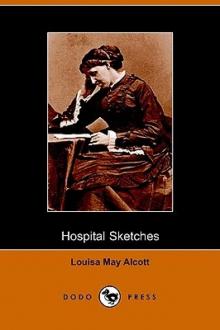 Hospital Sketches
Hospital Sketches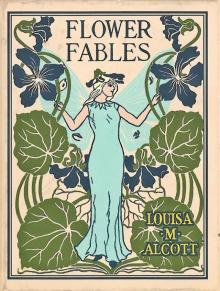 Flower Fables
Flower Fables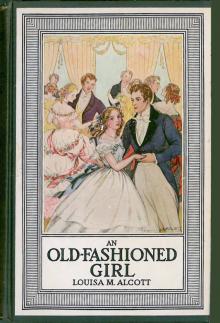 An Old-Fashioned Girl
An Old-Fashioned Girl The Candy Country
The Candy Country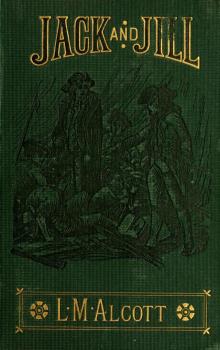 Jack and Jill
Jack and Jill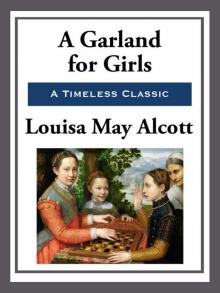 A Garland for Girls
A Garland for Girls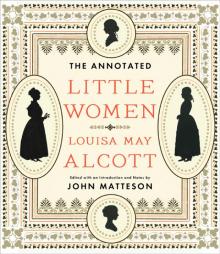 The Annotated Little Women
The Annotated Little Women A Classic Christmas
A Classic Christmas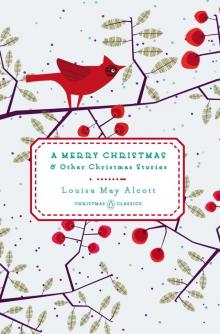 A Merry Christmas
A Merry Christmas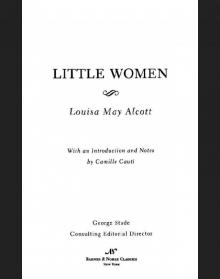 Little Women (Barnes & Noble Classics Series)
Little Women (Barnes & Noble Classics Series)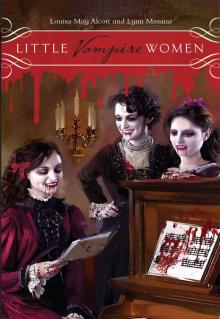 Little Vampire Women
Little Vampire Women